SNHU School Of Engineering, Technology and Aeronautics Building Named to Honor President Paul LeBlanc
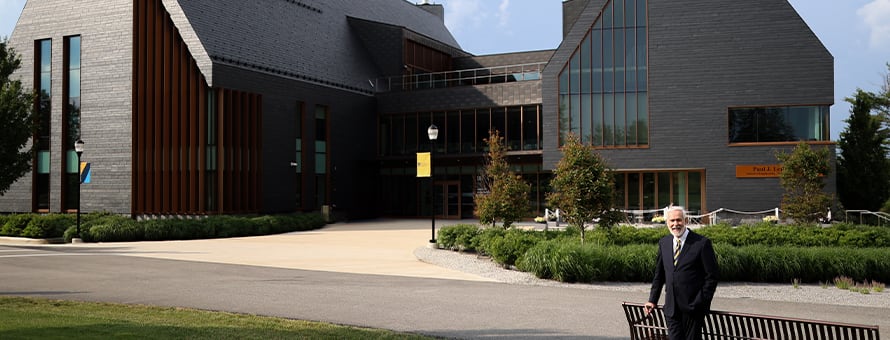
In recognition of 21 years of dedicated leadership, this week the Southern New Hampshire University (SNHU) Board of Trustees moved to name the School of Engineering, Technology and Aeronautics (SETA) facility, the Paul J. LeBlanc Hall, honoring the indelible impact President Paul LeBlanc has made on the university. Late last year, LeBlanc announced his decision to step down from his role at the end of June. A surprise ceremony was held Thursday on the Manchester, New Hampshire, campus to unveil the naming of the SETA facility for LeBlanc. It is one way the SNHU community is coming together in LeBlanc’s final weeks as president.
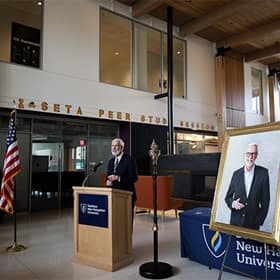
The unveiling, led by incoming President, Lisa Marsh Ryerson, was a complete surprise for LeBlanc, who described the moment by sharing, “I'm incredibly honored and this was a great surprise. I would have been happy if they just kept my name on the racquetball court.
“This is my favorite building on campus and it’s the greatest honor. I promised I’d stay out of Lisa’s way, but I’m going to come visit my building from time to time” added LeBlanc.
Under LeBlanc’s leadership since 2003, SNHU has transformed from a small regional university to an internationally known leader in higher education, growing from 2,500 students to more than 225,000 learners. While LeBlanc is widely known as the driving force behind the growth of SNHU’s online programs, his strong connection to campus can be told through stories like the creation of the SETA program.
SETA was established in 2017 after the sudden closure of Daniel Webster College (DWC) to expand access to affordable and accessible engineering degree programs in the New England region. Under LeBlanc's leadership, SNHU entered into a “teach-out” agreement to allow DWC students to complete their programs at SNHU. Dr. Kyle Viator, dean of SETA described feeling impressed by LeBlanc’s actions during the DWC transition and its lasting impact on making STEM degrees more accessible in the region.
“It really is a beautiful story of us going in and doing the right thing and being able to expand our campus options for our students as a result,” Viator said. “The DWC employees were hired, the students were taken under our wing, and we were able to get them to graduation that year or transition them back to campus. That’s almost unheard of and the fact that we were then able to take the best that Daniel Webster College had, move it up to our campus in Manchester, New Hampshire, and then be able to build these outstanding programs and build SETA. It has had such an impact on the New Hampshire community and STEM options that we offer here in the state. We’re very grateful to Paul here in SETA for the work that he did with Daniel Webster College and for the direction that he set us off on all those years ago.”
In a 2017 Penmen Press article about upcoming campus projects at the time, LeBlanc described the plans for the SETA building as being “really well designed for innovation and design thinking and creativity,” something Viator remembers fondly.
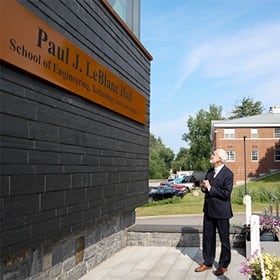
“I think this happens to be one of Paul’s favorite places on campus,” Viator said of the SETA facility. “We see him here often because it encapsulates 20 years of what he’s seen on campus and his vision for what the faculty and student interactions could be and how important space is in building those relationships.”
While SETA has existed since the teach-out of all DWC programs, its facility — located in the heart of the SNHU campus — was officially opened in 2020. The 67,000-square-foot academic building is the official home of SNHU’s on campus SETA programs, helping to prepare students for in-demand STEM careers.
Viator, who first met LeBlanc as a student, describes having had a front row seat to SNHU’s expansion and LeBlanc’s legacy of leading in service of the changing needs of learners.
“This facility is a collaborative workspace that encourages project-based learning and strong faculty and student interactions. That’s what Paul wanted for SETA and that’s what he wanted for the campus,” Viator said. “This isn’t just an engineering and technology building, it’s a building for everyone on campus. We have art classes here, education classes, math classes, so it really is a place for all of campus to come and learn.”
As LeBlanc reflected on his last week at SNHU, he shared, “I’m incredibly moved by all of this and often say that the key to a happy life is to find work you love, do it with people you love, for people you love, and I’ve had all three of those in my time here at SNHU. Thank you.”
About Southern New Hampshire University: Southern New Hampshire University (SNHU) is a private, nonprofit institution with a 90-year history of educating traditional-aged students and working adults. Now serving more than 180,000 learners worldwide, SNHU offers approximately 200 accredited undergraduate, graduate and certificate programs, available online and on its 300-acre campus in Manchester, NH. Recognized as one of the “Most Innovative" regional universities by U.S. News & World Report and one of the fastest-growing universities in the country, SNHU is committed to expanding access to high quality, affordable pathways that meet the needs of each learner. Learn more at www.snhu.edu.
Contact:
Siobhan Lopez
Director of Media Relations
Southern New Hampshire University
Cell: 603.567.4589
s.lopez@snhu.edu
Past Press Releases
SNHU Opens New College of Engineering, Technology and Aeronautics Facility
The opening was marked with a ribbon cutting ceremony on January 13
Lauren Keane
Jan 14, 2020

Manchester, N.H.(January 13, 2020) –Southern New Hampshire University (SNHU) celebrated the opening of its new College of Engineering, Technology and Aeronautics (CETA) facility with a ribbon cutting ceremony on Monday, January 13. The new 67,000-sqft academic building now houses SNHU’s on campus CETA programs and will help prepare students for in-demand STEM careers.
 “All of us at CETA are thrilled to have this magnificent new space in which to teach, learn, and discover,” said Kirk Kolenbrander, Executive Vice President of CETA, SNHU. “We are delighted to put this space to work –hard work --as we contribute to SNHU’s mission to transform lives.
“All of us at CETA are thrilled to have this magnificent new space in which to teach, learn, and discover,” said Kirk Kolenbrander, Executive Vice President of CETA, SNHU. “We are delighted to put this space to work –hard work --as we contribute to SNHU’s mission to transform lives.
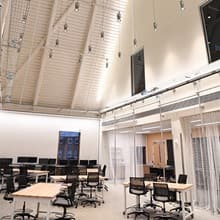 ”The three-story facility features a myriad of amenities and work spaces,including flexible teaching labs, a drone flying arena, an unmanned aerial vehicle prep space,a wood shop,a robotics lab, a wind tunnel, a 3D printing lab, virtual reality equipment, and program-specific laboratories. It also features CDIO (Conceive, Design, Implement and Operate) hubs where students can work on projects from conception through operation, turning them into real-world solutions and products.
”The three-story facility features a myriad of amenities and work spaces,including flexible teaching labs, a drone flying arena, an unmanned aerial vehicle prep space,a wood shop,a robotics lab, a wind tunnel, a 3D printing lab, virtual reality equipment, and program-specific laboratories. It also features CDIO (Conceive, Design, Implement and Operate) hubs where students can work on projects from conception through operation, turning them into real-world solutions and products.
The University broke ground on the new CETA facility in 2018 with the help of Wilson-HGA, a Boston-based architectural firm,and Skanska, a global construction and development firm. Construction was completed within a year and a half.
 “Education lays the foundation for opportunity and with the delivery of SNHU’s new College of Engineering, Technology and Aeronautics building, we are helping to provide space for the next generation to learn about STEM, cornerstones of careers in construction,”said Bryan Northrop, Executive Vice President of Building Operations for Skanska in Boston. “STEM-educated professionals are in high-demand, and we embrace the opportunity to provide a creative space that educates the next generation of innovators.”
“Education lays the foundation for opportunity and with the delivery of SNHU’s new College of Engineering, Technology and Aeronautics building, we are helping to provide space for the next generation to learn about STEM, cornerstones of careers in construction,”said Bryan Northrop, Executive Vice President of Building Operations for Skanska in Boston. “STEM-educated professionals are in high-demand, and we embrace the opportunity to provide a creative space that educates the next generation of innovators.”

“Understanding SNHU’s goal to find the best ways to prepare learners for the future pushed us, as designers, to look at the effect that space can have on students and pedagogies,” said Chris Martin, Vice President,Wilson-HGA. “That thinking, coupled with the goal to have a campus statement that highlighted the importance of these disciplines on campus drove the design. The building is the result of a true collaboration between SNHU and the design/construction team, and is a testament to SNHU’s commitment to push their STEM disciplines to the forefront in the educational landscape."

SNHU’s College of Engineering, Technology and Aeronautics was established in 2017 after the sudden closure of Daniel Webster College to expand access to affordable and accessible engineering degree programs in the New England region. While CETA has existed since the teach-out of all DWC programs, this new facility–located in the heart of the SNHU campus –will be the official home of the University’s expanded STEM programs.
Prior to the opening, CETA operated out of a 20,000-sqft annex adjacent to SNHU’s Manchester campus. CETA now serves more than 330 undergraduate students on campus and offers nine degree programs, including:
- Aeronautical Engineering
- Aviation Management
- Aviation Operations and Management
- Computer Science
- Air Traffic Management
- Construction Management
- Electrical and Computer Engineering
- Mechanical Engineering
- Information Technologies
To download photos and footage of the facility and ribbon cutting, please click here.
About Southern New Hampshire University
Southern New Hampshire University (SNHU) is a private, nonprofit institution with an 87-year history of educating traditional-aged students and working adults. Now serving more than 130,000 learners worldwide, SNHU offers over 300 accredited undergraduate,graduate and certificate programs, available online and on its 300-acre campus in Manchester, NH. Recognized as the "Most Innovative" regional university by U.S. News & World Report and one of the fastest-growing universities in the country, SNHU is committed to expanding access to high quality, affordable pathways that meet the needs of each learner. Learn more at www.snhu.edu.
SNHU Announces Plans for New College of Engineering, Technology and Aeronautics
Lauren Keane
Apr 14, 2017
Manchester, N.H. (April 14, 2017) - Southern New Hampshire University (SNHU) is pleased to announce the new College of Engineering, Technology and Aeronautics (CETA), established to expand affordable and accessible engineering degree programs in the New England region. Starting in the fall of 2017, students will have the opportunity to pursue a range of new programs at SNHU, including aeronautical engineering, electrical and computer engineering, and mechanical engineering.
With the new engineering school, SNHU seeks to prepare students for in-demand engineering careers, and help to provide access to underrepresented populations in STEM fields. Nationwide, only 13% of all engineering degrees are awarded to women and only 25% of engineering degrees are earned by minorities. Engineering jobs continue to be in high demand in both New Hampshire and across the United States. Currently, there are more than 1,180 open engineering positions in New Hampshire. However, only 502 New Hampshire students graduated with a bachelor's degree in engineering in 2014-2015, according to JobsEQ.
"SNHU has long been committed to building degree programs and educational pathways to meet the workforce needs of our time, and we are thrilled to expand opportunities in science, technology, engineering, and mathematics (STEM) to help our students get the education and skills they need to be successful," said Paul LeBlanc, President, SNHU. "The College of Engineering, Technology and Aeronautics continues and extends SNHU's national role in providing equity and access to affordable, high-quality engineering degree programs that will meet the needs of each student."
The College of Engineering, Technology and Aeronautics will focus on project-based learning, design thinking, and problem solving techniques. Core to the program will be its strong employer and industry partnerships both in New Hampshire and nationally. SNHU plans to open a new state-of-the-art engineering facility in 2019. While the building is being planned and constructed, the University will convert warehouse space on campus into fully equipped labs and classrooms.
SNHU has appointed James Smith, former United States ambassador to Saudi Arabia and a graduate of the United States Air Force Academy, to lead the new College of Engineering, Technology and Aeronautics. He received his master's in history from Indiana University, and is a graduate of the Naval War College, the Air Command and Staff College and the National War College. In his new role, he will lead the College in building its academic programs and continue to develop strategy for future STEM programs at SNHU.
"I am honored to join SNHU in this new role to help develop and expand access to high-quality engineering and aeronautic programs to students in the region," said Smith. "SNHU is constantly challenging the status quo when it comes to innovation and education, and I look forward to working with everyone in the SNHU community to further that mission and help prepare leaders in the engineering field for decades to come."
Angie Foss, will move over to CETA from SNHU's College of Online and Continuing Education (COCE), to serve as the Associate Dean of Operations. Foss has a strong background in computer and electrical engineering and a passion for a more inclusive and diverse landscape in engineering.
Gaynelle Swann will also join SNHU this May as the Associate Dean of Academics for CETA. In this role, Swann will work to evolve the curriculum for CETA as well as develop outreach programs for the College. Swann brings more than 20 years of engineering experience working in the automotive and aerospace/defense industries for both Raytheon and Ford Motor Company. She earned her bachelor's degree in engineering from Tuskegee University and completed her master's degree at Georgia Tech.
"We are thrilled to welcome Jim and Gaynelle to the SNHU community," said LeBlanc. "Together, they bring impressive backgrounds and an array of experiences to the University, and I am confident they will inspire the next generation of engineering students at SNHU."
SNHU hopes to expand engineering education to local K-12 students as well, with the state's first Challenger Learning Center. Created by The Challenger Center for Space Education, Challenger Learning Centers use space-themed simulated learning and role-playing strategies to help students bring their classroom studies to life and cultivate problem solving skills, critical thinking, communication and teamwork.
The first students of the College of Engineering, Technology and Aeronautics will begin in the fall of 2017.
SNHU Announces New Athletics Facility
Lauren Keane
Dec 22, 2016
MANCHESTER, N.H. - Southern New Hampshire University broke ground over the summer on a brand new $25-million multi-sport stadium for the Department of Athletics that will be home to men's and women's soccer, men's and women's lacrosse, men's and women's tennis, and women's track & field. The facility, which will also host select field hockey home games, is expected to open in the Fall of 2017.
"We are beyond thrilled to officially announce what we believe will be an unrivaled facility, not just in the state, but in our region, across all three divisions," said Director of Athletics Anthony Fallacaro. "This state-of-the-art complex will make Southern New Hampshire even more competitive on the recruiting scene and will solidify our place as one of the top Division II institutions in the region, as we continue to expand our national recognition. All of the credit goes to President Paul LeBlanc, Executive Vice President & University College Provost, Patty Lynott, Dean of Students, Heather Lorenz and our facilities team for their effort in this project as they continue to create new, cutting-edge facilities that will help to provide a first-class academic experience for our students."
The new complex will house a 1,500-seat stadium overlooking a Field Turf surface that will include Musco lighting. The field will be lined for soccer, women's and men's lacrosse, and field hockey. A sound system, as well as a state-of-the-art video and scoreboard from Daktronics, will adorn the new stadium. The facility, set on 23 acres, will also include an IAAF-certified, eight-lane Beynon Sports Surfaces BSS 1,000 track that will surround the field, and a dedicated throws area next to the stadium. The new complex will also include a new six-court tennis facility. The University is also exploring the potential for a future heated bubble for the winter for the tennis facility.
The concourse level of the facility will accommodate ticket booths, concession stands and restrooms, while the inside of the facility will feature media and productions suites, a custom, two-level, 5,200-square foot strength and conditioning center, a training room, equipment room, expansive locker rooms, 16 offices for coaching staffs, and a Penmen Club space with sliding doors that open to a balcony with intimate views of the playing surface.
The complex was planned by CannonDesign, an integrated global design firm that unites a dynamic team of strategists, futurists, researchers, architects, engineers, and industry specialists. The project is being built by Consigli Construction Co., a leading construction manager and general contractor headquartered in Milford, Mass., with offices in Boston, Mass., Portland, Maine, Hartford, Conn., Washington, D.C., and Pleasant Valley and Albany, N.Y.
The announcement for the new athletic complex comes a week after SNHU announced a tuition freeze, part of SNHU's commitment to provide a first-class education while keeping costs of a college education within reach for all students.
For the latest on Southern New Hampshire University athletics, follow the Penmen via social media on Twitter, Facebook, Youtube and Instagram. Sign up for the Penmen Athletics Newsletter to receive text message alerts and e-mail newsletters about your favorite Penmen teams.
Explore more content like this article
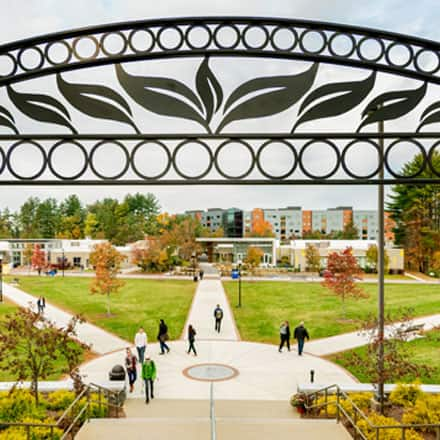
President's and Dean's List Fall 2025

Military Student Stories Elevated, CHEPP Research Unveiled at SNHU Event

SNHU Recognized as a Top Employer in Higher Ed, Leader in Innovation
About Southern New Hampshire University

SNHU is a nonprofit, accredited university with a mission to make high-quality education more accessible and affordable for everyone.
Founded in 1932, and online since 1995, we’ve helped countless students reach their goals with flexible, career-focused programs. Our 300-acre campus in Manchester, NH is home to over 3,000 students, and we serve over 135,000 students online. Visit our about SNHU page to learn more about our mission, accreditations, leadership team, national recognitions and awards.

